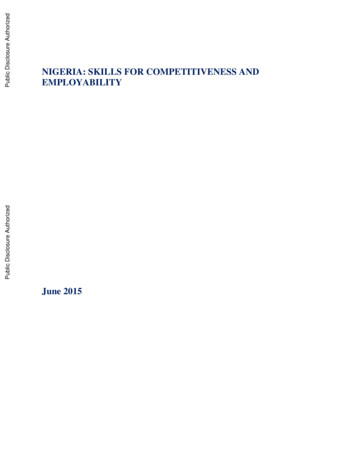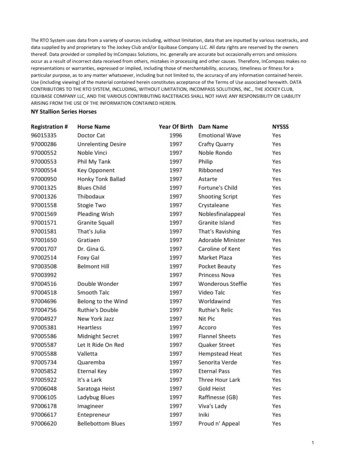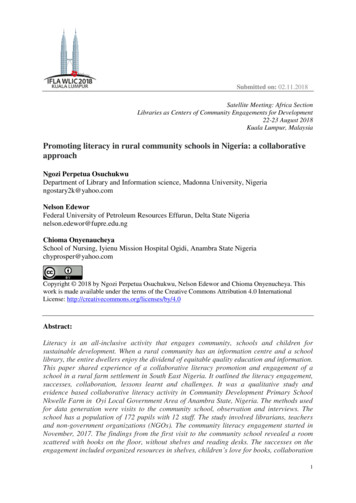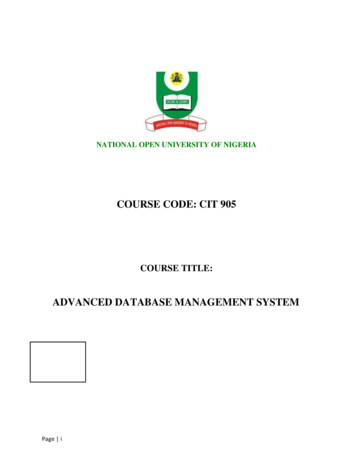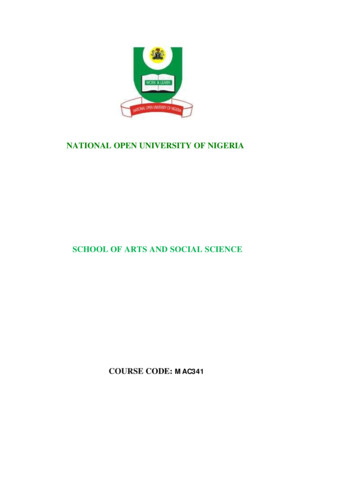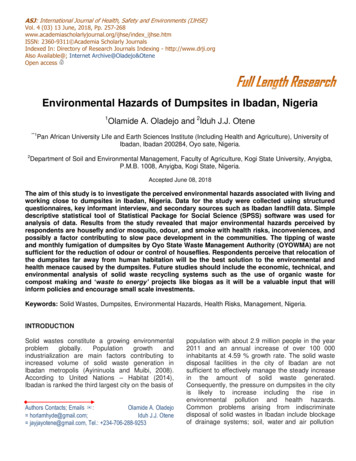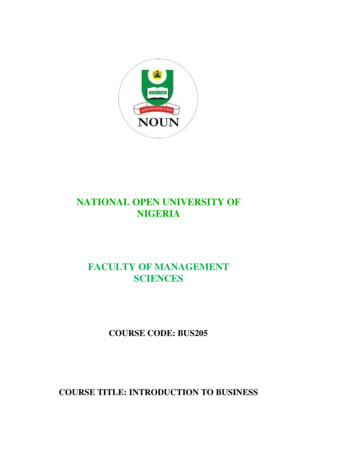
Transcription
S PECIAL R EPORT SERIESOBSERVING THE1998-99 NIGERIA ELECTIONSF INAL R EPORTThe Carter CenterNational Democratic Institutefor International AffairsS UMMER 1999
T HE C ARTER C ENTER STRIVES TO RELIEVE SUFFERING BYADVANCING PEACE AND HEALTH WORLDWIDE ; IT SEEKS TO PREVENTAND RESOLVE CONFLICTS , ENHANCE FREEDOM AND DEMOCRACY , ANDPROTECT AND PROMOTE HUMAN RIGHTS WORLDWIDE .NDI WORKS WITH DEMOCRATS IN EVERY REGION OF THE WORLD TOBUILD POLITICAL AND CIVIC ORGANIZATIONS, SAFEGUARD ELECTIONS,AND PROMOTE CITIZEN PARTICIPATION, OPENNESS ,AND ACCOUNTABILITY IN GOVERNMENT .
NDINDITHE CARTER CENTEROBSERVING THE 1998-99 NIGERIA ELECTIONSOBSERVING THE1998-99 NIGERIA ELECTIONSFINAL REPORTDEMOCRACY PROGRAMTHE CARTER CENTERONE COPENHILLATLANTA, GA 30307(404) 420-5185FAX (404) 420-3862WWW.CARTERCENTER.ORGNATIONAL DEMOCRATIC INSTITUTEFOR INTERNATIONAL AFFAIRS1717 MASSACHUSETTS AVE. N.W., SUITE 503WASHINGTON, DC 20036(202) 328-3136FAX (202) 939-3166WWW.NDI.ORGSUMMER 19991
THE CARTER CENTERNDIOBSERVING THE 1998-99 NIGERIA ELECTIONSSOURCE: CENTRAL INTELLIGENCE AGENCY, USA, MAY 19932
NDINDITHE CARTER CENTEROBSERVING THE 1998-99 NIGERIA ELECTIONSTABLE OF CONTENTSNigerian Presidential Elections Delegation and Staff List4List of Abbreviations7Foreword8Executive Summary10Background: From Brutal Repression to Open Elections13Nigeria: Past to PresentFrom Abacha to AbubakarTransition Issues15Constitutional Framework and Rules of the GameVoter RegistrationPolitical PartiesCampaign and Electoral CompetitionMonitoring the Elections18BriefingsDeploymentObservation MethodologyNDI/Carter Center Election Activities21October Assessment TripsDec. 5 Local ElectionsJan. 9 State and Governors ElectionsPresident Carter’s January VisitFeb. 20 National Assembly ElectionsFeb. 27 Presidential Election Observation MissionPreliminary Assessment and Post-election ObservationsPost-election es38About The National Democratic Institute and The Carter Center723
THE CARTER CENTERNDIOBSERVING THE 1998-99 NIGERIA ELECTIONSNIGERIAN PRESIDENTIAL ELECTIONSDELEGATION AND STAFF LISTFeb. 23 – March 1, 1999Leadership TeamThe Honorable Jimmy Carter, 39th President of the United States; Carter Center ChairMrs. Rosalynn Carter, former First Lady of the United States; Carter Center Vice ChairThe Honorable Mahamane Ousmane, Former President of the Republic of NigerGeneral Colin Powell, Former Chairman, U.S. Joint Chiefs of StaffDelegation MembersPauline Baker, President, Fund for Peace, USAHis Royal Highness Moulay Hicham Benabdullah, Prince of MoroccoRichard Blum, Chairman, Richard C. Blum and Associates, L.P., USAAllison Boyer, Africa Project Officer, Cohen & Woods International, USACharles Brumskine, President Pro-Tempore of the Liberian Senate, LiberiaShari Bryan, Resident Director in Nigeria, National Democratic Institute (NDI), USAAlessandra Cabras, NGO Liaison, Global Coalition for Africa, Italy/USAJason Calder, Program Coordinator, Global Development Initiative, The Carter Center, USADavid Carroll, Associate Director, Democracy Program, The Carter Center, USAJames Carter IV, Bachelors student, Georgia State University, USACharles Costello, Director, Democracy Program, The Carter Center, USAGillian Flies, Associate Director/Logistics Manager, Carter Center Nigeria Office, USAChris Fomunyoh, Regional Director, Central, East and West Africa, NDI, USAShirley Robinson Hall, Former U.S. Representative to the United Nations; former NDI boardmember, USAJames Kavanagh, Consultant to Moroccan Prince Moulay Hicham Benabdullah, USASharon Pratt Kelly, Former Mayor of Washington, D.C.; President/CEO, ATC Research, USADarren Kew, Doctoral student, Fletcher School of Law and Diplomacy, Tufts University, USARobert La Gamma, Director, Carter Center Nigeria Office, USAPeter Lewis, Assistant Professor, School of International Service, American University, USAPaul Lubeck, Professor, Sociology and History, University of California at Santa Cruz, USAPrinceton Lyman, Former U.S. Ambassador to Nigeria and South Africa; Overseas DevelopmentCouncil, USACarrie Manning, Assistant Professor, Political Science, Georgia State University, USAMariano Matsinhe, Member of Parliament and Head of Commission for NationalAffairs, Mozambique4
NDINDITHE CARTER CENTEROBSERVING THE 1998-99 NIGERIA ELECTIONSHenry McConnon, Private sector, optics wholesaler and retailer, USAPatrick McConnon, Associate Director, Program Development, National Center for Infectious Diseases, Centers for Disease Control and Prevention, USATim McCoy, Senior Program Officer for Central, East and West Africa, NDI, USAMora McLean, President, African-American Institute, USAGwendolyn Mikell, Director, African Studies Program, and Professor, Anthropology, School of ForeignService, Georgetown University, USAYusuf Mwawa, Member of Parliament, MalawiMarie Nelson, Director for Africa Policy, Rainbow/PUSH Coalition, USAJohn Paden, Clarence J. Robinson Professor of International Studies, George Mason University, USADave Peterson, Senior Program Officer for Africa, National Endowment for Democracy, USAPearl Robinson, Program Director, International Relations, and Associate Professor,Political Science, Fletcher School of Law and Diplomacy, Tufts University, USALinda Rotblatt, Legislative Assistant to Senator Russell D. Feingold (D-WI), USAKarin Ryan, Assistant Director for Human Rights, Conflict Resolution Program, The CarterCenter, USASoedjana Sapi’ie, Professor, Electrical Engineering, Bandung Institute of Technology, IndonesiaNadia Sood, Masters student, International Affairs, Columbia University; Researcher, Ford FoundationProject on Ethnic Conflict, USAGeorge Springer, President, Connecticut Federation of Educational and ProfessionalEmployees, USAShandal Sullivan, Executive Assistant to the Associate Executive Director for the Control and Eradication of Disease, The Carter Center, USARose Waruhiu, Executive Director, The Democratic Foundation, KenyaCharles Williams, Chief of Staff and Legislative Director for Congressman Jim McDermott(D-WA), USALaurie Wiseberg, Founder/Executive Director, Human Rights Internet; Adjunct Professor, GraduateSchool of Common Law, University of Ottawa, CanadaKirk Wolcott, Program Coordinator, Conflict Resolution Program, The Carter Center, USAKenneth Wollack, President, National Democratic Institute for International Affairs, USA5
THE CARTER CENTERNDIOBSERVING THE 1998-99 NIGERIA ELECTIONSNDI/Carter Center StaffEMMA SEIMODEIMatthew Cirillo, Finance Manager, Financial Administrator, The Carter Center, USACatherine Clarke, Logistics Assistant, Student intern, The Carter Center, UKDeanna Congileo, Press Officer, Senior Associate Director of Public Information, The CarterCenter, USATunde Durosinmi-Etti, Logistics Coordinator, Carter Center in Nigeria, NigeriaTynesha Green, Field Office Manager, Program Administrative Assistant, Democracy Program,The Carter Center, USAEric Happel, Field Support Officer, Program Officer, NDI, USACurtis Kohlhaas, Leadership Coordinator, Conference Coordinator, Conference and Events PlanningDepartment, The Carter Center, USACurtis Majekodunmi, Logistics Assistant, Carter Center in Nigeria, NigeriaKarine Pouchain, Logistics Assistant, Student intern, The Carter Center, FranceBrent Preston, Assistant Logistics Manager, Carter Center in Nigeria; independent public opinionconsultant, CanadaMichael Thayer, Field Support Officer, Program Officer, NDI; Assistant Logistics Manager, CarterCenter in Nigeria, USASara Tindall, Logistics Officer, Carter Center Liberia Field Director, USASome of the 66-person NDI/Carter Center delegation gather in Abuja for dinner Feb. 28, 1999,the day after observing the Nigeria presidential election.6
NDINDITHE CARTER CENTEROBSERVING THE 1998-99 NIGERIA ELECTIONSLIST OF ABBREVIATIONSAlliance for DemocracyAll People’s PartyConstitutional Debate Coordinating CommitteeEuropean UnionInternational Foundation for Election SystemsIndependent National Electoral CommissionInternational Republican InstituteLocal Government AreaNational Democratic CommitteeNational Democratic Institute for International AffairsNongovernmental organizationOrganization for African UnityPeople’s Democratic PartyProvisional Ruling CouncilTransition Monitoring GroupUnited NationsU.S. Agency for International DevelopmentEMMA PPRCTMGUNUSAIDThe NDI/Carter Center leadership team meets with delegates to draft a statement during a debriefing inAbuja. From left, NDI President Kenneth Wollack; delegation co-leaders retired Gen. Colin Powell,Rosalynn and President Carter; and Carter Center Democracy Program Director Charles Costello. Notshown is delegation co-leader, former Niger President Mahamane Ousmane.7
THE CARTER CENTERNDIOBSERVING THE 1998-99 NIGERIA ELECTIONSFOREWORDTorganizations. At the invitation of all key politicalfigures in Nigeria, our two institutions organizedelection assessment and observation missions foreach round of the transition process, including a 66member international delegation to observe theFeb. 27 presidential election.The Carter Center and NDI have a long and deepinterest in Nigeria’s welfare and in the region. TheCarter Center maintains strong health and agriculture projects in the country, and NDI continues itswork with newly elected officials, democraticinstitutions, and pro-democracy NGOs. We have asolid history of working together on joint electionmonitoring projects. Both institutions have experience in assessing political processes and observingelections, either separately or jointly, throughnumerous delegations around the world.Nigeria presented various political and logisticalchallenges, perhaps greater than either organizationhad faced in its previous election monitoring efforts.For one, the country’s desire to quickly replace themilitary with a civilian administration provided fora brief transition period – just four months from anOctober registration exercise through a series offour elections for local councilors and chairmen,state assemblymen and governors, National Assembly representatives, and the president. Complicating matters was the country’s vast size and population, poor communications system, frequent fuelshortages, and run-down infrastructure.The Feb. 27 election of retired Gen. OlusegunObasanjo, as the culmination of a political transition to install democratically elected civilianofficals at all levels of government, represents alandmark opportunity for Nigeria. This transitionfrom military to civilian rule was conducted generally without violence, and for that, Nigerians shouldbe justifiably proud. However, the registrationprocess and all four election rounds were marred, tohe importance of fostering democracy inNigeria cannot be overstated. The mostpopulous country in Africa, a dominant regional military and economic power, and one of thelargest exporters of petroleum in the world, Nigeria is anation of vast natural and human resources. It is also anation of greatly unrealized potential, plagued fordecades by financial mismanagement, widespreadcorruption, and explosive ethnic tensions. Successivemilitary and civilian governments have plundered thepublic coffers and allowed the nation’s infrastructureand productive capacity to fall apart.After 15 straight years of military rule, whichreached stifling levels of repression during Gen. SaniAbacha’s five-year regime, Nigerians hungered forchange. A fervent desire to elect a civilian presidentand live under a democratic system of governmentdominated the aspirations of nearly all Nigerians.This occurred with a brutal military dictator’spassing, an enlightened leader’s unexpected rise topower, and the Nigerian people’s determination.With Gen. Abdulsalami Abubakar’s rise topower following Gen. Abacha’s death in June 1998,Nigeria’s pace of political change has been remarkable. Before last summer, the prospects for a democratic opening seemed dim, with many politicaldetainees languishing in prison and harsh limitsplaced on press freedoms and public expression.However, within weeks of Gen. Abubakar’s accession, political parties were legalized, politicalprisoners were released, the press became unfettered, and a new timetable announced Nigeria’sreturn to democratically elected civilian rule.Seeing the potential for nongovernmental organizations (NGOs) to assist, The Carter Center and theNational Democratic Institute for International Affairs(NDI) responded positively to overtures from theNigerian government, the Independent NationalElectoral Commission (INEC), and civil society8
NDINDITHE CARTER CENTEROBSERVING THE 1998-99 NIGERIA ELECTIONSengaged as Nigerians move toward the democratic,transparent, and equitable society that so manyhave desired for so long. Given that the first step onthis steep road toward democracy was a shaky one,commitment from all sectors is vital. Keeping trueto this path will mean an improvement in the livesof millions of Nigerians and will serve as an inspiration throughout Africa and around the world. varying degrees, by electoral irregularities, andsometimes, outright fraud. Both Nigerian civilsociety and the new government should explicitlycommit to achieve electoral reforms before thenext round of elections to remove this corruptingstrain from the new Nigeria’s political life.We thank the delegates who participated inour missions for their contributions, especially theco-leaders who joined President Carter for thepresidential election observation: former Presidentof Niger Mahamane Ousmane and former Chairman of the U.S. Joint Chiefs of Staff Gen. ColinPowell. We also would like to thank CharlesCostello of The Carter Center and ChristopherFumunyoh of NDI, who directed the NigeriaProject for their respective organizations.We are especially grateful to the United StatesAgency for International Development (USAID),whose generous funding made this initiative possible.We also appreciate the support from private donorswho supplemented that funding.An important positive development in theseelections was the formation and commitment ofthe Transition Monitoring Group (TMG). Thiscoalition of 64 Nigerian pro-democracy organizations fielded more than 10,000 domestic observersin all 36 states for the presidential election,providing perspective and the most comprehensive monitoring force for the election. TMG’smembership and leadership crossed all ethnic,regional, and religious barriers, making it a trulynational coalition. We are grateful to the TMG, aswell as other local and international observergroups, for their level of cooperation during thetransition process. These organizations’ continuedactive participation in civic affairs will be criticalto democratizing Nigerian society over the longterm.Although the efforts of election officials,observers, and others were crucial to the transition, the most important actors remain the peopleof Nigeria. The international community must stayPresident Jimmy CarterChairmanThe Carter Center9Kenneth WollackPresidentNDI
THE CARTER CENTERNDIOBSERVING THE 1998-99 NIGERIA ELECTIONSEXECUTIVE SUMMARYThe sudden death of military dictator Gen.ment to democracy, and identify and report onSani Abacha in June 1998 and the positivepotential obstacles involved in a credible transition tosteps taken by his successor, Gen. Abdulcivilian rule. The initiative’s three primary goals weresalami Abubakar, raised hopes that Nigeria againto:might become a democratically elected civiliangovernment. Nigeria’s importance, coupled with Assess the election process in the context ofits size, wealth, and political instability, promptedthe broader political transition.President Carter to call the ensuing elections “the Focus international and national attentionmost important in the world this year.”on the transition’s implementation.In fall 1998, NDI and The Carter Center sent Lend the international community’s support,separate teams to Nigeria to establish relationshipsencouragement, and technical assistance to Nigerianswith Nigerian democrats, assess their needs duringas they chose their leaders.the transition process, and determine what role thetwo organizationsProgram activitiesmight play incentered on conductingassisting Nigeria toFrom the outset, NDI and The Carter Center recog- small, high-levelfoster democracy.international proBased on these tripsassessment missions tocess with guarded optimisim.and invitationscoincide with the Dec.from the Nigerian5, 1998, local elections;government, NDIthe Jan. 9, 1999, stateand The Carter Center agreed to design and impleand gubernatorial elections; the Feb. 20 Nationalment projects to support Nigeria’s democratic transiAssembly elections; and a larger international obsertion to civilian rule.vation mission for the Feb. 27 presidential election.From the outset, NDI and The Carter CenterAdditional activities included organizing a joint triprecognized that most Nigerians viewed the transito Nigeria, led by President Carter, in January duringtion process with guarded optimism. While manythe middle of the transition; NDI’s ongoing support toapplauded Gen. Abubakar’s intent to return thethe TMG domestic monitors; and The Carter Centercountry to democratic rule, they knew he was partarranging for a media consultant to lead a workshopof Gen. Abacha’s regime and the military was stillfor journalists covering the elections.firmly in control. Additional concerns included theFor the Dec. 5 and Jan. 9 elections, delegatesabsence of a national constitution to guide thereported that polling was largely orderly andelections, a flawed voter registration process, andpeaceful and most Nigerians they encountered feltcampaigns largely devoid of issues or politicalthe elections represented a positive step in theplatforms.transition. However, the delegates also notedAs a result, The Carter Center and NDI moniseveral clear shortcomings in the administration oftored the transition at all stages of the electoralboth elections and recommended improvements.process. They also continuously engaged NigerianFrom Jan. 18-23, President Carter led a mission topolitical leaders in discussions to gauge their commitNigeria to meet with Gen. Abubakar, potential10
NDINDITHE CARTER CENTERJASON CALDEROBSERVING THE 1998-99 NIGERIA ELECTIONSRepresenting Nigeria’s future, these children pose on a street in Lagos.tion, both in Nigeria andabroad, and underlined thepotential for a problematicpresidential election thefollowing week.For the Feb. 27 presidential election, The CarterCenter and NDI organized a66-member internationaldelegation from 12 countriesthat observed 335 pollingsites in 20 of Nigeria’s 36states. Members convenedin the capital city of AbujaFeb. 28 and reviewed apreliminary statementdeveloped from field reports.At a press conference thatevening, President Carterread from that statement, inwhich the delegation notedpositive election aspects andirregularities.National returns showed Gen. Obasanjo of thePeople’s Democratic Party (PDP) winning theelection by a margin of 18 million to 11 millionvotes over Chief Olu Falae of the joint Alliance forDemocracy (AD)/All Peoples Party (APP). Basedon alleged irregularities, Chief Falae immediatelyannounced that the entire process had been “afarce.” NDI/Carter Center delegate leaders met withGen. Abubakar to share their concerns over theflawed electoral process. They later met with ChiefFalae, who informed them that he was planning toappeal the results. After President Carter left Nigeria that night, retired Gen. Colin Powell and otherdelegates met with Gen. Obasanjo to discuss theelection returns.The delegates reconvened after the first pressconference for more discussion and drafted a secondstatement for release the next morning, March 1. ByBy then, the delegates had received more comprehen-candidates, party agents, and others from a crosssection of society. The team also met with INECChairman Justice Ephraim Akpata, who, at President Carter’s request, agreed to accredit thousandsof additional TMG domestic observers for trainingby NDI to observe the next two election rounds.While voting for the Feb. 20 National Assembly elections adhered to electoral regulations inmany places, NDI/Carter Center delegates andobservers from other organizations reported lowvoter turnout and serious irregularities nationwide.Abuses of the electoral process – including ballotstuffing, inflation of results, and voter intimidation– were widespread enough to question the elections’outcome in certain electoral districts.The delegation recommended that INECcorrect the situation immediately, and PresidentCarter sent an open letter to INEC and the politicalparties stating his concern about the irregularities.These statements garnered considerable press atten11
THE CARTER CENTERNDIOBSERVING THE 1998-99 NIGERIA ELECTIONSKARIN RYANsive reports from the field, analyzed data that themonitors had gathered, and compared the data toofficial results being reported from INEC. Thedelegation’s second statement was more comprehensive and focused on irregularities in greaterdetail, including inflated vote returns, ballot boxstuffing, altered results, and the disenfranchisementof voters.Afterward, President Carter signed a letter onbehalf of The Carter Center that was sent to INECChairman Akapata. It stated, “There was a widedisparity between the number of voters observed atthe polling stations and the final results that havebeen reported from several states. Regrettably,therefore, it is not possible for us to make anaccurate judgment about the outcome of thepresidential election.”NDI and The Carter Center, as well as otherorganizations involved in the transition, made specificrecommendations in their public statements designed toimprove future elections. Summaries and completetexts of each of the NDI/Carter Center statements arein this report’s appendices.An election is not by itself sufficient to institutionalize democracy. A strong civil society, ongoing peacebuilding initiatives, protection of human rights, andtransparent and effective governance are essential.The international community must do all it can toencourage the new government and opposition partiesto work together to promote genuine democracy andinclusiveness and assist Nigeria in regaining its place asa leader in Africa and the rest of the world. NDI andThe Carter Center intend to remain engaged in Nigeriato contribute to achievement of these objectives. This Lagos man seems skeptical, as many Nigerians,about the military government’s promise to hand overpower.12
NDINDITHE CARTER CENTEROBSERVING THE 1998-99 NIGERIA ELECTIONSBACKGROUND:FROM BRUTAL REPRESSION TO OPEN ELECTIONSAseries of military coups, attempted coups,and failed efforts to establish democracyhave marked Nigeria’s political history.After gaining independence from Great Britain in1960, the nation’s military leaders ruled for 29 of its39 years and throughout the last 15 years. (SeeAppendix A for a list of Nigerian heads of State.)While most of these rulers vowed to return powerto the civilians, only Gen. Olusegun Obasanjo as amilitary head of state in the 1970s did as promisedin 1979. Since then, a series of civilian and militaryadministrations have squandered Nigeria’s richpetroleum wealth and vast human potential. Thesituation reached its lowest point during the repressive regime of Gen. Sani Abacha, who had designsto prolong his dictatorship indefinitely.The current transition program represents theculmination of a long and difficult process of politicaltransition in Nigeria. It also represents the first steptoward establishing sustainable democracy in a countrythat has yet to hold two successive presidential elections. To better understand the challenges facingNigeria and the importance of these elections, it isnecessary to examine earlier events.the northwestern Hausa-Fulani, southwesternYoruba, and southeastern Igbo – became dominantrivals. The stresses of ethnic and regional competition led to political turbulence and civil war in thelate 1960s, and these tensions have influenced thenation’s politics in succeeding years. The quest fordemocratic government has occupied many leaderssince 1966, when the military overthrew the firstparliamentary government.In the ensuing decades, military leaders havegoverned for all but four years. Nigeria’s economywas transformed in the 1970s, when the countryemerged as a leading oil exporter. Yet the new bountydid not bring prosperity or development. Instead, itsignaled a massive increase in corruption and mismanagement, as civilian and military leaders struggled overcontrol of the central government and its revenues.These deep-seated challenges have been evident inrecent crises. In June 1993, Gen. Ibrahim Babangida’sregime conducted presidential elections as the finalstep in a promised democratic transition. Althoughthe poll yielded an apparent winner – Chief M.K.O.Abiola, a popular Yoruba businessman – Gen.Babangida annulled the election. He abdicated hiseight-year reign, however, and installed a civiliancaretaker government, which Gen. Abacha quicklyshouldered aside.NIGERIA: PAST TO PRESENT1Nigeria’s dilemma has deep historical roots.Like most African states, Nigeria was anartificial creation of colonialism, includingsome 250 ethnic and linguistic groups, of which three –FROM ABACHA TO ABUBAKARThe new regime harassed and detainedjournalists, human rights activists, politicians, and other dissidents or rivals. ChiefAbiola was arrested along with dozens of government critics. In November 1995, the governmentexecuted Ken Saro-Wiwa and eight compatriotsfrom the Ogoni community, who had agitated for1Political consultant Dr. Peter Lewis of AmericanUniversity in Washington, D.C., contributed thishistorical overview, which was published in The CarterCenter’s 1997-98 State of World Conflict Report.13
THE CARTER CENTERNDIOBSERVING THE 1998-99 NIGERIA ELECTIONSenvironmental standards and economic rights inthe country’s oil-producing areas. Many countriesand international organizations condemned theseexecutions and restricted aid and relations withNigeria. Ultimately, the pall of political repressionbrought with it economic decline and deepeningsocial strains.The Abacha government sought to burnish itsimage by announcing political and economicreforms. Despite the promise of a new democratictransition agenda, the government permitted onlyfive carefully screened parties to participate inelections and conducted the program in a repressive political atmosphere. In April 1998, all fiveparties nominated Gen. Abacha as their solecandidate for the presidency, leading many todenounce the transition as a manipulated exerciseto preserve the military’s power.Political dissent and social tension gave rise towider instability. Demonstrations and riots engulfed themajor southwestern cities where Chief Abiola’s baseof support resided. Anti-government bombings alternated with anonymous shootings of opposition figures. In the southeastern oil-producing areas, theOgoni and other ethnic minorities continued to pressfor equity and environmental improvements. In thenorthern cities, a dissident popular Islamic movement challenged traditional authorities. Two majorcoup attempts rocked the military, which was besetwith factionalism, while rumors developed aboutother revolts.On June 8, Gen. Abacha died suddenly, reportedly of a heart attack. Gen. Abdulsalami Abubakarreplaced him, quickly taking steps to reverse someof the most unpopular features of Gen. Abacha’srule. Several prominent political prisoners werereleased, the regime began a dialogue with thedomestic opposition, and the country’s diplomaticisolation eased.Despite these hopeful steps, the country wasthrown into turmoil when Chief Abiola died suddenly14on July 7, while still in detention. Official reportsand an independent foreign-led autopsy attributedthe death to a heart attack, but Chief Abiola’sfamily and sup-porters bitterly criticized the militarygovernment. Rioting after Abiola’s death claimed atleast 60 lives. Within two weeks, Gen. Abubakarannounced a new program for transition to democratic rule, set to conclude in May 1999.
NDINDITHE CARTER CENTEROBSERVING THE 1998-99 NIGERIA ELECTIONSTRANSITION ISSUESTbefore the December local elections. It was to bebased on the 1995 constitution drafted under Gen.Abacha’s regime and revised extensively by Gen.Abacha but never released from his administration.Gen. Abubakar later announced the appointment ofthe Constitutional Debate Coordinating Committee(CDCC) to organize public debate and recommend anew constitution. Gen. Abubakar hand picked theCDCC, which conducted all of its work behind closeddoors.In December, the CDCC recommended theadoption of the 1979 constitution with some amendments based on the 1995 draft. The 1979 constitutionwas created through a relatively transparent processduring Gen. Obasanjo’s regime, and many Nigeriansviewed the CDCC’s recommendation positively. Themilitary government, however, never formally announced that the CDCC’s recommendations would beimplemented.he pace of political change in Nigeria hasbeen extremely rapid since the death ofGen. Abacha. Following his demise, Nigeriawitnessed the legalization and creation of politicalparties, vast improvements in the level of pressfreedom and political competition, and the completion of four rounds of elections. The initial transitiontoward civilian rule, completed with Gen. Obasanjo’sswearing in as president on May 29, took less than ayear from when the transition began. Despite theseand other generally positive developments, severalissues surfaced during the transition process thatcaused serious concern and add to the challenges ofbuilding a democratic future in Nigeria.CONSTITUTIONAL FRAMEWORKAND RULES OF THE GAMEEMMA SEIMODEINigeria’s transi
THE CARTER CENTER 4 OBSERVING THE 1998-99 N IGERIA E LECTIONS NDI NIGERIAN PRESIDENTIAL ELECTIONS DELEGATION AND STAFF LIST Feb. 23 - March 1, 1999 Leadership Team The Honorable Jimmy Carter, 39th President of the United States; Carter Center Chair Mrs. Rosalynn Carter, former First Lady of the United States; Carter Center Vice Chair The Honorable Mahamane Ousmane, Former President of the .


